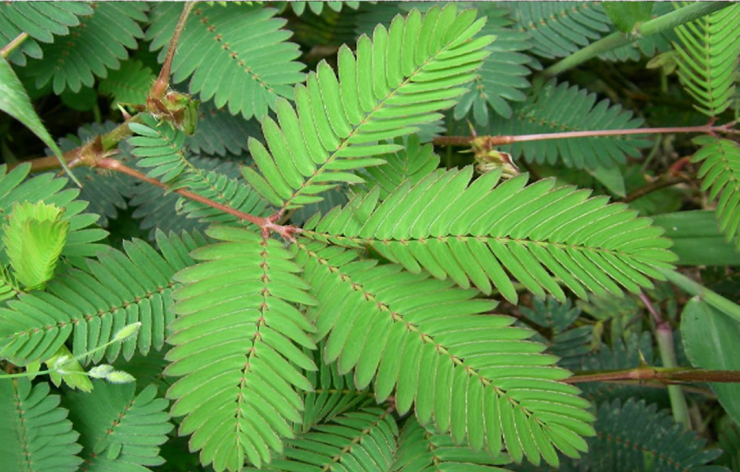Mimosa pudica, also called the “sensitive plant” or “touch-me-not,” is a remarkable plant known for its ability to fold its leaves when touched. Beyond this unique feature, it has been used in traditional medicine for centuries. Its medicinal properties provide various health benefits, from aiding in wound healing to improving digestive health. Let’s explore the medicinal properties and uses of Mimosa pudica.
Medicinal Properties of Mimosa Pudica
Antimicrobial: Mimosa pudica has potent antimicrobial properties that help combat bacterial and fungal infections.
Anti-inflammatory: Its anti-inflammatory effects make it useful for treating wounds, joint pain, and skin conditions.
Antioxidant: This plant is rich in antioxidants, which protect the body from oxidative stress and free radical damage.
Astringent: Mimosa pudica’s astringent properties help tighten tissues and reduce bleeding, aiding wound healing.
Antiparasitic: Traditionally, it has been used to expel intestinal worms and parasites, especially in Ayurvedic medicine.
Sedative: The plant’s mild sedative effects can calm the nervous system and improve sleep quality.
Antidiarrheal: Mimosa pudica helps alleviate diarrhea by strengthening intestinal walls and promoting healthy digestion.
Medicinal Uses of Mimosa Pudica
Treats Wounds and Skin Infections: Mimosa pudica is commonly used for wound healing. Its antibacterial and anti-inflammatory properties make it effective in treating cuts, burns, and infections. Crushed leaves can be applied directly to wounds to speed up healing.
Supports Digestive Health: Mimosa pudica is often used to manage digestive disorders such as diarrhea and irritable bowel syndrome (IBS). Its antidiarrheal properties strengthen the intestines and reduce fluid loss while also eliminating parasites.
Expels Intestinal Parasites: Mimosa pudica seeds are well-known for their antiparasitic effects. In traditional medicine, they are used to remove worms like tapeworms and roundworms, with the plant’s active compounds helping to paralyze and expel these parasites.
Reduces Inflammation and Pain: Mimosa pudica’s anti-inflammatory properties make it useful for reducing joint pain and swelling. It can be consumed as tea or applied as a topical paste to alleviate discomfort.
Improves Respiratory Health: The plant is used in traditional medicine to treat asthma, bronchitis, and cough by reducing mucus buildup and inflammation in the airways.
Calms the Nervous System: Mimosa pudica has mild sedative properties that help reduce anxiety, stress, and insomnia. Drinking tea made from the plant can promote relaxation and better sleep.
Promotes Uterine Health: Traditionally, Mimosa pudica is used to support reproductive health in women by addressing issues like irregular menstruation and uterine disorders while also reducing menstrual cramps.
Helps Manage Diabetes: Some studies suggest that Mimosa pudica can help regulate blood sugar levels by improving insulin sensitivity and reducing glucose absorption, making it beneficial for managing diabetes.
How to Use Mimosa Pudica
Mimosa Pudica Tea: Boil the leaves in water for 10-15 minutes and drink the tea to benefit from its anti-inflammatory and digestive properties.
Topical Paste: Crush fresh leaves into a paste and apply directly to wounds, cuts, or inflamed areas to promote healing.
Mimosa Pudica Powder: Grind the seeds into a powder, which can be taken in capsules or mixed with water to help expel parasites and support digestion.
Tinctures: Mimosa pudica tinctures are widely available in health stores and can be taken orally to enhance overall wellness.
Mimosa pudica is much more than a sensitive plant. Its antimicrobial, anti-inflammatory, and antiparasitic properties make it a valuable herb in traditional medicine. Whether used to treat wounds, support digestion, or promote relaxation, this plant offers a variety of health benefits. As with any herbal remedy, consult a healthcare provider before use, particularly if you are pregnant, nursing, or have preexisting conditions.
Related Posts:

Seventeen Years Later, a Father Returned Hoping to Make Things Right

Why a Medical Condition Could Affect Barron Trump’s Eligibility for U.S. Military Service

After My Husband’s Passing, I Asked My Stepson to Help With Bills — What I Discovered Later Changed Everything

The First Thing You Notice in This Image Might Say Something About Your Perspective

Which U.S. Regions Might Be Most Exposed in a Hypothetical Global Conflict Scenario?


